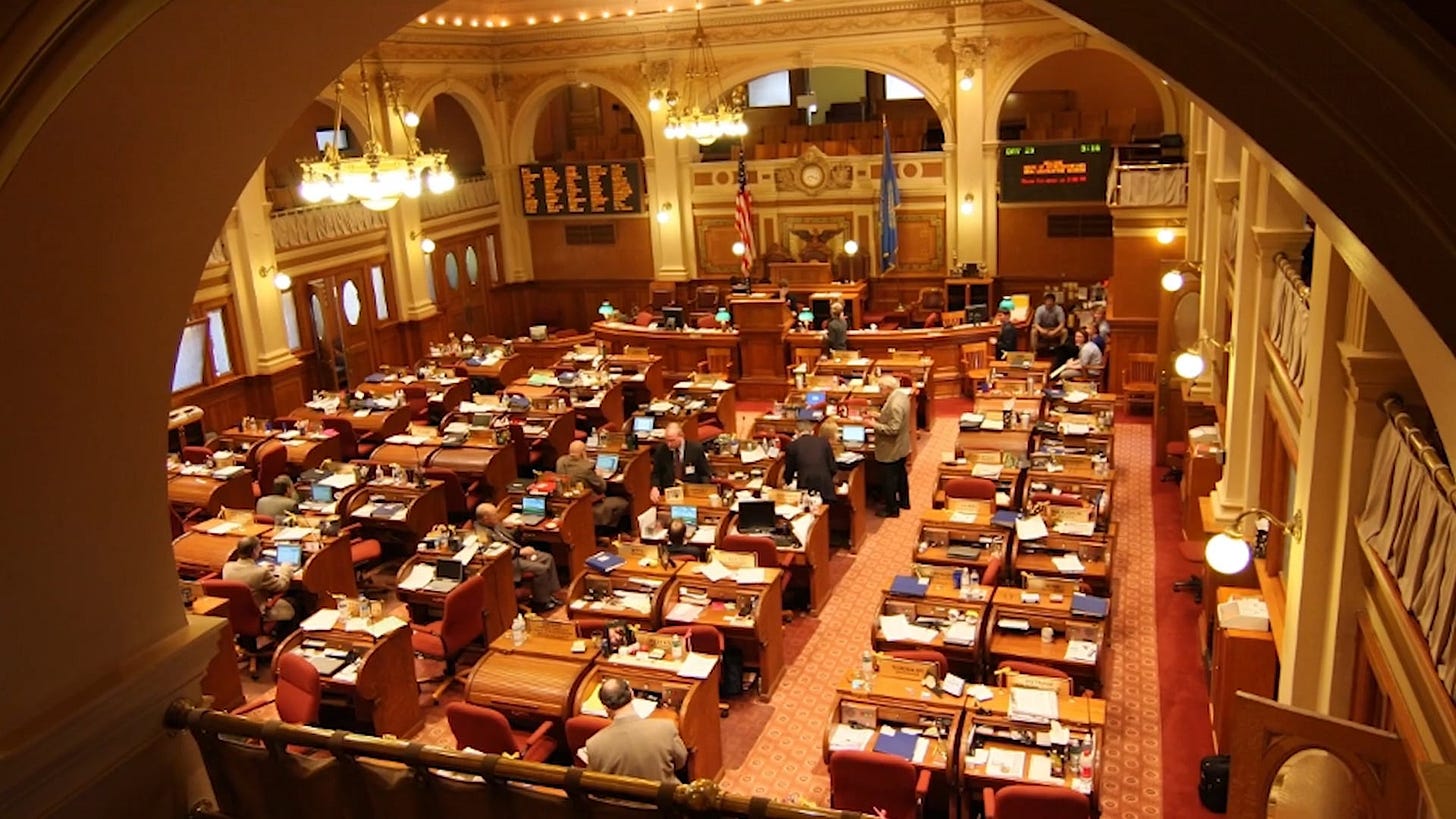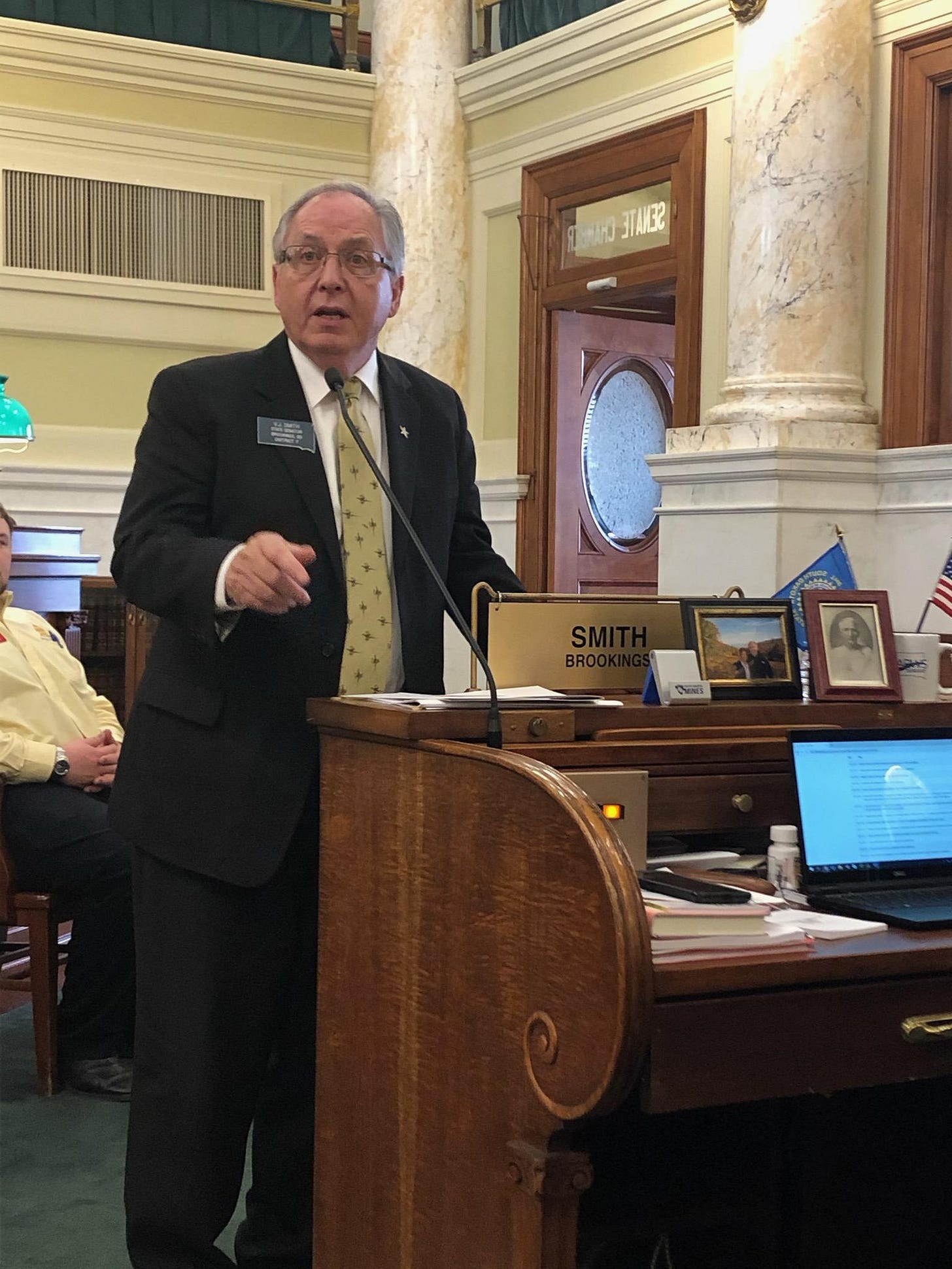Juvenile justice bill passes Senate
PIERRE – Senate Bill 198, which would revise the provisions related to juvenile offenders, is advancing in the state Legislature, having passed in the state Senate last week. The bill was introduced and sponsored by District 7 Sen. V.J. Smith.
History of juvenile justice
SB 198 is a direct response to a bill from 2015, SB 73. SB 73 looked to reform the juvenile justice system in South Dakota. SB 73’s biggest move was to eliminate certain offenses from being Department of Corrections (DOC) referable. Non-violent crimes, like truancy and drug use, are now only punishable with parole, and youth who are guilty of such crimes remain in their communities rather than being sent to DOC juvenile correction centers. Violent offenders can still be sent to detention centers.
A large push was made for this bill because then-Gov. Dennis Daugaard highlighted that, at the time, South Dakota had the second highest number of youth per capita in detention centers.
“In fact, the most recent national figures show South Dakota with the second highest juvenile incarceration rate in the nation. And let me be clear, the high rate is not connected to a commensurately high rate of violent juvenile crime. In fact, South Dakota's juvenile violent crime arrest rate is one-third the national average,” Daugaard said in his January 2015 State of the State speech. “So, we have a violent crime rate with juveniles being one-third of the national average, and yet in the national average, we are the second highest state in the nation for locking up or putting juveniles in the hands of the Department of Corrections. Our juvenile incarceration rate should encourage us to act.”
SB 73 passed through the state Legislature and became law.
Fast-forward to 2022 and lawmakers are now looking to revisit the changes made by SB 73.
The 2022 bill, SB 198, would first create a “interim juvenile placement committee” which would “develop alternatives for placement of juvenile offenders, develop findings, report on findings, and recommend legislation.”
The rest of the bill would repeal or amend many of the juvenile justice provisions that came from SB 73. If SB 198 were to pass, the amended or repealed sections would go into effect on July 1, 2023 – after the placement committee presented findings to the Legislature at next year’s session.
Proponents
Smith explained in committee testimony that over the past year he has visited nearly every school in South Dakota and has spoken with teachers and administrators.
“Ten years ago, nobody talked about discipline issues. In the past four years, that all changed,” Smith said. “Now, few talk about salaries. They all talk about discipline.”
Smith shared that he recently spoke to a teacher who he had known for a long time who said that she was excited to be near retirement so she could quit.
“She said, ‘More than half of my day is spent disciplining and counselling,’” Smith said. “‘I don’t seem to do much teaching anymore.’”
Smith said data shows the current system is working, but “what the data doesn’t show is the number of teachers who are quitting because of discipline issues in a state where we have 600 teacher openings.”
“The data won’t show that a classroom environment is destroyed by just one student,” Smith said. “There is a negative spillover effect on students who truly want to learn.”
Smith explained that he didn’t want to place any blame on anybody but said lawmakers must find solutions to this problem.
“There needs to be consequential consequences for bad behavior,” Smith said.
Brookings School District Superintendent Klint Willert testified in support of SB 198.
Willert explained that every year there are challenges and crises in school districts across South Dakota, but this issue is not a “large school or a “small school” issue rather it is a “South Dakota issue.”
Willert said students have become increasingly disruptive and are affecting staff members and students who want to be there. Students have figured out that there are no real consequences for disruptive and inappropriate behavior, he added.
“The net effect of these changes in the juvenile justice system five years ago by this Legislature has effectively removed juvenile justice from a state responsibility to a financial obligation squarely placed on the backs of our schools and our local communities,” Willert said. “Our schools were not designed for these types of challenges.”
On top of the juvenile justice reform, the legislation did not provide any support or resources to the local school districts, Willert pointed out.
Ryan Rollinger, principal at Harrisburg High School, explained that everyone can support keeping kids out of detention centers for petty crimes, but kids who are committing much more serious crimes are re-entering the school while awaiting trial or when they are adjudicated.
Rollinger said some of the more serious crimes include robbery, weapons possession, committing crime while in possession of a weapon, assault, battery, and attempted murder.
“I think a lot of parents would be taken aback if they knew some of the students who are either accused or adjudicated of those crimes were being put back into the schools,” Rollinger said.
Students know that there are very little “teeth” to the juvenile justice system, Rollinger said, and he has been told to his face, “I don’t care, they are just going to give me three more months of probation.”
Other proponents include Dianna Miller, from the Large School Group; Wade Pogany, from Associated School Boards of South Dakota; and Mitch Richter, from the United School Association of South Dakota, among others.
Opponents
Kristi Bunkers, representing the South Dakota DOC, explained that SB 198 “goes too far” as it would overturn all the revisions to the juvenile justice reform from 2015.
She said that the reform did what was expected, and the incarceration population has been reduced. Further, the money saved from that reduction has been used for diversion programs and community-based rehabilitation. According to Bunkers, the DOC has been responsible for distributing $1.8 million to counties to support diversion.
“Since 2016, the first year of implementation (for juvenile justice reform), the majority of young people being committed to the DOC continue to come on non-violent offenses,” Bunkers said.
In (fiscal year) 2021, the top three committing offenses to the DOC were grand theft, simple assault, and probation violations, per Bunkers.
Bunkers explained that if SB 198 were to pass and the revisions were repealed, South Dakota would be out of compliance with the Juvenile Justice Delinquency Prevention Act. This means the state of South Dakota would lose a significant amount of funds that are used for local efforts.
Another issue, that Bunkers pointed out, is a shortage of beds for incarcerated youth in South Dakota. Passing SB 198, coupled with the already present workforce shortage, would only further extenuate the problem.
Greg Sattizahn, from the Unified Judicial System, said they support a study group but do not support repealing the other 46 sections that make up SB 198.
Other opponents included the South Dakota Association of Criminal Defense Lawyers and Lutheran Social Services of South Dakota.
Doug Hoffman, a juvenile court judge, also spoke in opposition to SB 198.
“I can report that the state of the juvenile court system is the best that it ever has been in my career,” Hoffman said. “The reforms of SB 73 were much needed and have resulted in incredible outcomes for so many kids.”
Hoffman said he hears over 3,500 hearings a year and only a very “minuscule” amount of kids commit those very serious crimes that were previously mentioned in testimony.
Rebuttal
Sen. Lee Schoenbeck (R-Codington), an attorney, handled the rebuttal for Smith and explained that “we do have wardens now. They are called principals and school administrators.”
“We do have a whole bunch of juvenile prisons. You know what they are called, public school districts,” Schoenbeck said. “You know what, they can say they don’t have any inmates, but that’s not counting the 100,000-some plus students in our state that are now sharing the yard with the criminals that we are parking in our school systems.”
Senate hearing
During Senate testimony, Smith reiterated a story about a teacher who was assaulted in the classroom.
“The administrator said the teacher is now in the hospital and the kid is back in the classroom,” Smith said. “This has got to stop.”
Smith further explained that he has been told that some prospective teachers are looking for different career paths because of the discipline issues in the schools.
Sen. David Wheeler (R-Beadle) pushed for an amendment that would keep the committee but not make any other changes, essentially keeping SB 73 intact. Wheeler warned that if the bill passed as presented, and the committee did not have any strong recommendations at next year’s session, juveniles would likely need to be sent out of state, which would cost a significant amount of money. Wheeler’s amendment was struck down.
Sen. Arthur Rusch (R-Clay) said he has spent several years discussing the discipline issues with school principals and administrators, explaining that no one he has spoken to has a solution to the problems.
“The only solution I’ve heard from any of them was to eliminate the mandatory attendance age so they can kick the kids out who have disciplinary problems,” Rusch said.
Sen. Julie Frye-Mueller (R-Custer) explained that they had a solution, “It was called STAR Academy.”
The State Treatment and Rehabilitation (STAR) Academy was a juvenile corrections facility near Custer that was closed in 2016 by Daugaard, who cited a declining juvenile population under DOC jurisdiction and an anticipated future reduction in juvenile commitments.
A Brookings teen, Brady Folkens, died in 2013 after falling ill while in custody at the STAR Academy.
Vote
SB 198 passed with a simple 8-1 majority in the Senate State Affairs Committee. The lone dissenting vote was Troy Heinert (D-Todd County). On the Senate floor, the bill passed with a 22-13 vote.
SB 198 will now head to the House for further consideration. It’s been referred to House State Affairs.
March update:
Amended juvenile justice bill passes House State Affairs committee, House
By Addison DeHaven
The Brookings Register
PIERRE – An amended version of Senate Bill 198 passed the House State Affairs committee on Wednesday night. SB 198, which originally would “revise provisions related to juvenile offenders,” is now solely a bill that will create a “interim committee regarding alternatives for placement of juvenile offenders.” The bill’s prime sponsor is District 7 Sen. VJ Smith.
SB 198 is a direct response to a 2015 bill, SB 73, which took many of the Department of Correction placement options for juveniles off the table. Non-violent juveniles could no longer be placed in detention centers, instead they receive a parole sentence, remain in their communities, and complete diversion programs. Violent offenders can still be sentenced to detention centers.
“This bill is not intended to lock up children,” Smith said. “It’s a reaction to what we have seen as legislators.”
Over the past 15 years, Smith has noted that he has visited over 500 schools, throughout the US but mainly in the Dakotas, and he has heard a significant uptick in talk regarding student discipline. Further, he noted that there are over 600 teacher openings in this state, in large part due to the student discipline issues. He explained that teachers are leaving because they can no longer be in a classroom and substitutes won’t come back because “it isn’t what it was like a couple years ago.”
“Nobody talks about the teachers and nobody talks about the kids that are in class and want to get a decent education and they are tired of the disruptions,” Smith said. “They don’t want to be there either.”
District 17 Rep. Kevin Jensen (R-Lincoln) read testimony from his wife, who works with youth as a prevention specialist and an addiction counselor, explaining that data shows that the habits of youth (binge drinking, marijuana use) hasn’t changed since juvenile justice reform in 2015, but the number of youth entering treatment services has gone down significantly.
“Why? Because they are not being taken care of,” Jensen said, explaining that “we are not reaching many youth, nor are we addressing their needs.”
Further, he explained that grand theft auto, a felony, isn’t DOC referable under the current juvenile justice law.
Brookings School District Superintendent Klint Willert explained that in the Brookings School District, they have experienced first-hand the limitations of the juvenile justice laws. Further, he explained that students are becoming increasingly disruptive and flat out defiance, with “no regard for authority or order.”
Willert gave an example of an event that occurred earlier this winter, where a student stole a car over the weekend but was back in school on Monday. Because this event occurred outside of the school, the district could take no internal action, Willert said.
“What message does that send to other students?” Willert asked.
Over the last three months, the Brookings School District has experienced multiple resignations, due at least in part to the increased challenges in student discipline, Willert said.
“You heard from Mr. Willert about the Brookings School District, about as white collar of a community as you can get in South Dakota folks,” said Rob Monson, from the School Administrators of South Dakota. “This is Brookings, not Brooklyn, New York. The challenges they are having in Brookings, extrapolate that over the 148 school districts across our state. They could all be here tonight talking about this.”
Opponents
Kristi Bunkers, from the Department of Corrections, explained the SB 198 goes “too far” and the provisions that SB 198 is looking to repeal have produced the expected outcomes “for justice involved youth.”
Bunkers explained that since 2015, they have reduced the number of juveniles in detention centers and redirected those funds to community based rehabilitation efforts, including diversion programming.
“We’ve invest over $1.8 million dollars to counties to support diversion efforts,” Bunkers said. “88% of diversion participants did complete their program.”
Other opponents agreed that a interim study committee would be beneficial for all parties involved but repealing all the juvenile justice provisions which were established in 2015 would be “going too far.”
“I think we need to study it. I think that section 1 of this bill is extremely important for where we go as a state with juvenile justice but I also think we shouldn’t take a step back and dismiss some of the very positive things we have seen across our state,” said Greg Sattizahn, from the Unified Judicial System.
Vote
Rep. Spencer Gosh (R-Walworth) motioned for the bill to be amended. The amendment would remove all the repealed provisions, leaving only the interim summer placement committee. Jensen rebuttled, explaining that he would be resisting the motion because a repeal of the provisions would force action, rather than just create more conversation. The amended motion ultimately passed in a rather close voice vote.
The amended bill then passed the committee in a 12-0 vote.
“This summer study has to produce something,” said Rep. Jamie Smith (D-Minnehaha).
On the House floor, the bill passed 61-8. Because of the amendment, the bill will now go back to the Senate for another vote.
If passed, the interim juvenile placement committee will be made up of 24 individuals; eight appointed by the Governor. Five House of Representatives members will be appointed by the speaker and three members of the public, two with involvement in public education, also appointed by the speaker. The president pro tempore will appoint five members of the Senate and three members of the public, two which (at the minimum) with involvement in public education. The committee will deliver its report and recommended legislation to the state Legislature by Jan. 1, 2023.







